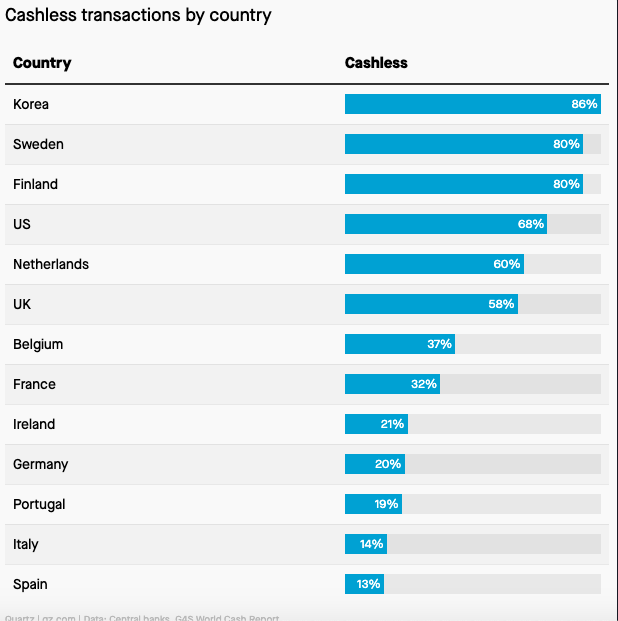How To Identify Fake Cryptocurrency And Avoid Scams
How To Identify Fake Cryptocurrency And Avoid Scams

The “cash is king” mantra seems to be losing any truth as digital money becomes the norm in transactions across the world. The use of cash has been threatened by the hygiene-related issues as a result of the Coronavirus pandemic. More people are opting for contact-free systems, and cash is taking a knock. Beyond the convenience of a cash-free system, more countries are looking beyond credit cards and are exploring a fully digital approach to currency. The news of countries exploring Central Bank Digital Currencies (CBDCs) has become commonplace recently. The national banks of increasing numbers of countries are looking to blockchain technology to integrate into their financial systems – and it’s possibly going to change the way people view Bitcoin
Looking at data reported by Quartz, the top countries which have a cashless approach to vendor transactions include few countries which are exploring CBDCs. Notable in this list is Sweden, which has been piloting a national digital currency. The United Kingdom has been reported to be investigating a CBDC too, but only to a limited extent.

In March this year, China was the first country to announce that it would be piloting a CBDC. While other central banks from different countries had been considering issuing a national government-backed cryptocurrency, China was the first to make initial steps to start testing the concept. Part of the driving factor for the decision is linked to the Coronavirus and the danger of spreading the virus as a result of physically handling cash.
Since China announced the pilot programme for testing a CBDC, other countries have begun to make the call to act. Now, the countries which are testing a CBDC to issue into public circulation include Sweden, The Bahamas, France, The Philipines, Japan, Turkey, and Switzerland.
According to a survey conducted by the Bank For International Settlements early this year, countries across the globe – both from developed and emerging markets – show interest. However, the split is not equal. The research shows that the banks from emerging markets might have stronger motivations towards issuing a CBDC and thus might be better positioned for earlier adoption for a national cryptocurrency.
Emerging market economies report stronger motivations and a higher likelihood to issue #CBDC than advanced economies. Cryptocurrencies remain a niche means of payment #digitalcurrency #centralbank #cryptocurrencies #wef20 #Davos2020 @BCoeure https://t.co/HjIjFJbF2H pic.twitter.com/0qLhE7lMj8
— Bank for International Settlements (@BIS_org) January 23, 2020
In June Cuy Sheffield, Visa’s head of cryptocurrency projects, stated that he firmly believes that the testing of CBDCs might be one of the most important shifts towards economic, social, and geopolitical inclusion. In a thread of tweets, the Visa figure stated:
“I’d argue that central bank digital currency (CBDC) is one of the most important trends for the future of money and payments over the next decade. Regardless of anyone’s personal views of whether it’s good or bad, the reality is that global interest in it is not going away. [CBDC’s will have] major implications for privacy, monetary sovereignty, geopolitics, and financial inclusion, as well as global adoption of crypto dollars and Bitcoin.”
This has been echoed by Ripple’s CEO Brad Garlinghouse, who thinks that the US Dollar will be in danger if the national bank does not start considering digital currencies. Garlinghouse commented, urging regulators to “step up” or risk the US currency losing its global power, while China (currently testing digital currencies) strengthens in fiat and cryptocurrency payments. In a tweet, he stated:
“[Now is the time to step up and lean into digital currencies. Remaining complacent is actually setting us back, while China’s grip on both crypto and fiat payments becomes stronger.”
Major investment firm JPMorgan Chase also believes that the US Dollar will be under threat if the national bank does not look to explore cryptocurrency options in conjunction with the fiat dollar. In a report, the firm suggested:
“There is no country with more to lose from the disruptive potential of digital currency than the United States. This revolves primarily around U.S. dollar hegemony. Issuing the global reserve currency and the medium of exchange for international trade in commodities, goods, and services conveys immense advantages.”
Over the past few months, as news from countries testing national digital currencies comes in, there is nothing to indicate an impact on Bitcoin’s value or the cryptocurrency market. Bitcoin, which is currently enjoying what looks like a healthy rally in price, did not seem to gain any massive upticks in price as central banks announced testing. Moreover, the trends for individuals searching Bitcoin and cryptocurrency from each country as their banks announced cryptocurrency pilots did not show any correlation, as researched through Google Trends. It is still early in the testing periods for the banks, however, and it’s likely that the more digital currencies are explored at national levels, the more individuals, investors and traders will consider buying Bitcoin either for use or to add to their investment portfolios.
How To Identify Fake Cryptocurrency And Avoid Scams
10 Reasons Why You Should Invest In Crypto
What Is The Future Of Cryptocurrency? Top Trends To Watch
Who Accepts Cryptocurrency And Bitcoin